How family fled home in Poland ahead of VE Day
 Herke family
Herke familySitting on his sofa in Berkshire, Peter Herke, now 84, recalls how his family fled their home in occupied-Poland 80 years on from VE Day.
He came from a family of German speakers who had lived in the city of Łodz for more than a century.
In the weeks before the war ended on 8 May 1945, the-then four-year-old, his parents, brother and new sister, who was born en-route, fled into Germany hoping for a better life.
One of the few possessions they had was an album of photographs in which his mother had chronicled his early life.

On the first page, facing a card announcing his birth, are two pictures of the baby Peter, being cradled in his mother's arms, less than a year after Hitler's troops had poured across Poland's borders.
Their arrival changed everything.
"We lived there under German control, I mean Hitler's people," he explained.
"My father worked in a cloth factory. They were told, you don't sell to private people, you only sell to us.
"We need uniforms and you're gonna do them," he recounted, in an accent betraying his German-speaking roots and later life in Canada.
The album showed how the regime changed things in the home as well as the workplace.
Turning the page, a picture shows Peter on his aunt's knee, between his mother's parents and their son-in-law, a doctor in military uniform.
"There you see," Peter pointed to the armband his uncle wore without naming the swastika symbol at its centre.
 Herke family
Herke familyHis father's age, 46, meant unlike many of the other German speakers, who had been conscripted, he had been left to continue his role as one of the factory managers. But then came a warning.
"The head of the Polish police force, who my father knew quite well, came to him one day and said 'look you're too high up to not actually join...," Peter paused searching for a word, "the Germans?".
"You mean he was being told to join the Nazi Party?" I asked.
"Yes, the police chief said otherwise they [the German authorities] could make people disappear.
"He just gave him the warning. He said to my father, as a friend, if you don't I'm worried I wont see you again."
His father signed up, taking on the role of treasurer to a women's social club.
By agreeing to join, even if under duress, it meant his father would forever be associated with a regime that was turning the city into one of the most infamous ghettos in Eastern Europe, as Jews were shipped there from other towns and cities across Poland.
Many who were put to work in support of the German war effort were later sent on to the death camps including Auschwitz where they were executed on their arrival.
 Herke family
Herke familyBy January 1945, the Soviet armies had pushed Hitler's forces back into Poland, close to Łodz, and he, his brother and his mother were told they would be leaving "for a few weeks".
Waiting for a train at the city's railway station, Peter recalled: "All of a sudden there's a crash and there's something coming in one window and going out the other.
"My father grabbed my brother and got under the table."
Peter ducked under the table too. "I said 'are we going to do hide and go seek? Is this a game?'"
It was not. Just hours after he, his mother and his brother left on the train, his father, who had originally been told he would be staying with the rest of the men, was ordered to head west too.
Germany surrendered the city to the Russian forces the following day.
"If they had still been there in the firm, they would have just been lined up and shot," said Peter. Learning about what had happened, as he grew up, he said he would not blame the advancing Russians if that had happened.
Other family members did not escape.
The uncle, pictured in his Nazi uniform in the family album, had been shot and killed by a Russian sniper. His wife, Peter's auntie, fearing the Red Army took her own life along with those of her three sons.
Peter was eventually reunited with his father six weeks later, in what was then Czechoslovakia.
 Reuters
Reuters"I jumped all over him. A four-and-a-half year old is happy that Dad's back," he recalled.
They joined thousands of Germans now desperate their war would end in territory controlled by the British or Americans rather than the Soviets.
Many towns and villages on the journey would allow them only one night's stay.
Peter recalled as a child thinking it fun to spend a night in a barn looking down on the animals below.
His mother, "a city girl," as he described her, thought it less of an adventure, especially the smell from the cattle.
Passing through one town, he recalled lorries full of American troops, driving down the main street.
"I stood at the side of the road and shouted heil Hitler, because you were taught that," he recalled.
"My Dad just put his hand over my mouth and said keep quiet."

The family found there way to what became West Germany, but when his father tried to move them to the United States, he was blocked because of his Nazi Party membership. Instead they eventually settled in Canada.
Peter returned to Europe in the 1960s working in the IT sector and settled in Berkshire.
The album is all that remains of the once privileged lifestyle they enjoyed long before Hitler's invasion.
But Peter and his immediate family survived, even if those around them on VE Day may have thought there was little to celebrate.
You can follow BBC Berkshire on Facebook, X, or Instagram.
